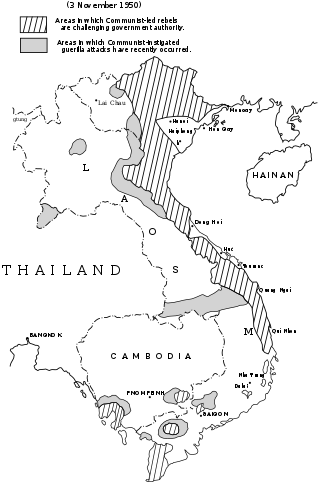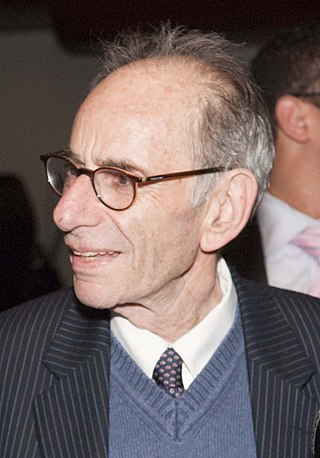
Marcos Orlando Letelier del Solar was a Chilean economist, politician and diplomat during the presidency of Salvador Allende. A refugee from the military dictatorship of General Augusto Pinochet, Letelier accepted several academic positions in Washington, D.C. following his exile from Chile. In 1976, agents of Dirección de Inteligencia Nacional (DINA), the Pinochet regime's secret police, assassinated Letelier in Washington via the use of a car bomb. These agents had been working in collaboration with members of the Coordination of United Revolutionary Organizations, an anti-Castro militant group.

The American Enterprise Institute for Public Policy Research, known simply as the American Enterprise Institute (AEI), is a center-right think tank based in Washington, D.C., that researches government, politics, economics, and social welfare. AEI is an independent nonprofit organization supported primarily by contributions from foundations, corporations, and individuals.

The Pentagon Papers, officially titled The History of U.S. Decision-Making in Vietnam, 1945–1968, is a United States Department of Defense history of the United States' political and military involvement in Vietnam from 1945 to 1968. Released by Daniel Ellsberg, who had worked on the study, they were first brought to the attention of the public on the front page of The New York Times in 1971. A 1996 article in The New York Times said that the Pentagon Papers had demonstrated, among other things, that Lyndon B. Johnson's administration had "systematically lied, not only to the public but also to Congress."

Social Democrats, USA (SDUSA) is a social-democratic organization established in 1972 as the successor of the Socialist Party of America (SPA). The SPA had stopped running independent presidential candidates and consequently the term "party" in its name had confused the public. Moreover, replacing the "socialist" label with "social democrats" was meant to disassociate the group from the Soviet Union.

Joshua Muravchik is a neoconservative political scholar. He resides in Washington, DC based World Affairs Institute, he is also an adjunct professor at the DC based Institute of World Politics and a former fellow at the Foreign Policy Institute of Johns Hopkins University’s School of Advanced International Studies (SAIS). He was formerly a fellow at the George W. Bush Institute (2012–2013), a resident scholar at the American Enterprise Institute (1987–2008), and a scholar in residence at the Washington Institute for Near East Policy (1985).

The Economic Policy Institute (EPI) is a 501(c)(3) non-profit American think tank based in Washington, D.C., that carries out economic research and analyzes the economic impact of policies and proposals. Affiliated with the labor movement, the EPI is usually described as presenting a left-leaning and pro-union viewpoint on public policy issues. Since 2021, EPI has been led by economist Heidi Shierholz, the former chief economist of the Department of Labor.

The Council on Hemispheric Affairs (COHA) is a Washington, D.C.-based non-governmental organization (NGO) founded in 1975. The organization can draw on a large number of interns of graduate and undergraduate students, who gain experience in different fields additionally receiving academic credit from their home institutions. COHA also attracts retired government employees who support COHA in preparing monographs on a variety of topics including regional development, trade policies, and the international lending agencies' controversial development strategies. Further support is provided by a number of COHA senior research fellows of different nationalities including the United States and Latin America, who are experts in their respective fields of engagement.

Saul Landau was an American journalist, filmmaker and commentator. He was also a professor emeritus at California State Polytechnic University, Pomona, where he taught history and digital media.

John Cavanagh is an American activist. He was the Director of the Institute for Policy Studies in Washington, D.C. from 1998 to 2021, and is a founding fellow of the Transnational Institute.
Richard Jackson Barnet was an American scholar who co-founded the Institute for Policy Studies.

Juan E. Méndez is an Argentine lawyer, former United Nations Special Rapporteur on Torture and Other Cruel, Inhuman or Degrading Treatment or Punishment, and human rights activist known for his work on behalf of political prisoners.

On 21 September 1976, Orlando Letelier, a leading opponent of Chilean dictator Augusto Pinochet, was assassinated by car bombing, in Washington, D.C. Letelier, who was living in exile in the United States, was killed along with his work colleague Ronni Karpen Moffitt, who was in the car with her husband Michael. The assassination was carried out by agents of the Chilean secret police (DINA), and was one among many carried out as part of Operation Condor. Declassified U.S. intelligence documents confirm that Pinochet directly ordered the killing.
The Joint Center for Political and Economic Studies is an American public policy think tank headquartered in Washington, DC. According to its mission statement, the Joint Center, through research, policy roundtables, and publications, produces innovative, high-impact ideas, research, and policy solutions that have a positive impact on people and communities of color. Ranking at #50 on the University of Pennsylvania's 2017 Global Go To Think Tank Index Report, the Joint Center served as the intellectual hub for a generation of post-Civil Rights era black thinkers, including Maynard Jackson, Mary Frances Berry, William Julius Wilson, Shirley Chisholm and John Hope Franklin. Originally founded in 1970 to provide training and technical assistance to newly elected African American officials, the Joint Center has since expanded its portfolio to include a range of public policy issues of concern to African-Americans, AAPIs, Latinos, and Native Americans.

Marcus Goodman Raskin was an American progressive social critic, political activist, author, and philosopher. He was the co-founder, with Richard Barnet, of the progressive think tank the Institute for Policy Studies in Washington, DC. He was also a professor of public policy at The George Washington University’s School of Public Policy and Public Administration.

Anas "Andy" Shallal is an Iraqi-American artist, activist, philanthropist and entrepreneur. He is best known as the founder and CEO of the Washington, D.C., area, restaurant, bookstore, and performance venue Busboys and Poets. He is also known for his opposition to the 2003 invasion of Iraq. He was a candidate for the city's mayoral election in 2014.
The Letelier-Moffitt Human Rights Award is awarded annually by the Washington, D.C.-based Institute for Policy Studies (IPS). It is awarded to those advancing the cause of human rights in the Americas. The Letelier-Moffitt Human Rights Award commemorates Orlando Letelier and Ronni Moffitt, who in 1976 were assassinated in Washington, D.C. by agents of the Chilean secret service. It was first presented in 1978.

The RAND Corporation is an American nonprofit global policy think tank, research institute, and public sector consulting firm. RAND Corporation engages in research and development (R&D) across multiple fields and industries. Since the 1950s, RAND research has helped inform United States policy decisions on a wide variety of issues, including the space race, the Vietnam War, the U.S.-Soviet nuclear arms confrontation, the creation of the Great Society social welfare programs, and national health care.

Tope Folarin is a Nigerian-American writer and executive director of the Institute for Policy Studies. He won the 2013 Caine Prize for African Writing for his short story "Miracle". In April 2014 he was named in the Hay Festival's Africa39 project as one of the 39 Sub-Saharan African writers aged under 40 with the potential and the talent to define the trends of the region. His story "Genesis" was shortlisted for the 2016 Caine Prize.
The Colibrí Center for Human Rights is a non-profit non-governmental organization that uses forensic anthropology and advocacy to identify lives lost on the United States–Mexico border and to help families find loved ones who have gone missing on the border. Their director Robin Reineke won a Letelier-Moffitt Human Rights Award in 2014.

The Transnational Institute(TNI), is an international non-profit research and advocacy think tank that was founded in 1974, Amsterdam, Netherlands. According to their website, the organization promotes a "... just, democratic and sustainable world."















